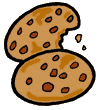This blog has been thought out by two English teachers in order to shorten not only the distance between the teachers and students but also to narrow the distance between the student and the language and its cultural, educational and some other aspects. So, get up from your couch and go improving you English, no matter if it's British or American!
Welcome!
Welcome to our blog!
11.20.2011
Como se diz “Vai trabalhar, vagabundo!” em inglês?
GOOD-FOR-NOTHING (s. adj.)
vagabundo, imprestável, inútil, malandro, parasita, preguiçoso
vagabundo, imprestável, inútil, malandro, parasita, preguiçoso
- Get a job, you good-for-nothing!
- Arranje um emprego, seu preguiçoso,parasita, inútil! Vai trabalhar, vagabundo!
COUCH POTATO
[pessoa preguiçosa que passa muito tempo na frente da televisão]
[pessoa preguiçosa que passa muito tempo na frente da televisão]
- He’s a real couch potato.
- Ele é muito preguiçoso e não sai da frente da televisão.
Como se diz “Fala logo!” em inglês?
 SHOOT !
SHOOT ![Desembucha!; Fala logo!]
- Don’t just stand there. If you have something to tell me, shoot!
- Não fique aí parado. Se você tem algo a me dizer, desembucha!
Phrasal Verbs: FINISH OFF
FINISH OFF
1. to end, to finish [finalizar, terminar, concluir, acabar]
1. to end, to finish [finalizar, terminar, concluir, acabar]
- The fat child finished off the whole bag of potato chips in a few minutes.
- A criança gorda acabou com o saco inteiro de batatinhas em poucos minutos.
- After William finished off waxing his car, he decided to go for a drive.
- Depois que William terminou de encerar seu carro, ele decidiu dar um giro.
2. to kill [matar, sacrificar, “acabar com”]
- The horse was so sick that the farmer thought the best thing to do was to finish it off.
- O cavalo estava tão doente que o fazendeiro achou que a melhor coisa a fazer era sacrificá-lo.
3. to defeat a person or team [derrotar uma pessoa ou time, “acabar com”]
- The boxer finished off his opponent in the sixth round of the fight.
- O boxeador derrotou o adversário no sexto assalto.
THING (s.)
THING (s.)
coisa, negócio, ser
- The only thing we have to fear is fear itself. (F. D. Roosevelt)
- A única coisa que temos a temer é o próprio medo.
- The giant redwood is the biggest living thing.
- A sequóia gigante é o maior ser vivo do planeta.
- Well, the thing is we never got along well.
- Bem, o negócio é que nós nunca nos demos bem.
Evite usar em excesso a palavra “coisa”. Sugestões: usar uma palavra mais específica: elemento, aspecto, fator, questão.
 There’s another thing to consider.
There’s another thing to consider.- Há outro fator, aspecto a se considerar.
- All these theories had one thing in common.
- Todas essas teorias tinham um elemento,fator em comum.
- The thing is…
- A questão , o problema é…
Outras sugestões:
- “Every man kills the thing he loves.” (Oscar Wilde)
- Todo homem mata aquilo que ama.
- How is it possible to define the source of all things?
- Como se pode definir a origem de tudo?
- The most important thing is…
- O mais importante é…
- Older Germans are being pushed out of the workforce. The same thing is happening in Italy and France.
- Os alemães mais velhos estão sendo expulsos da força de trabalho. O mesmo acontece na Itália e na França.
- Do the right thing.
- Agir certo, agir corretamente, tomar a decisão certa.
11.04.2011
Madonna
Ring, ring, ring goes the telephone:
Roberta: Hello ? Who is this, please?
Madonna: That´s me sweet !!
Roberta: Hi crazy !
Madonna: Hi dear ! Could you tell Lamarck to put a video about me, on the blog?
Roberta: Of course crazy !
THERE TO BE - VERBO HAVER
A expressão verbal formada pela palavra there + verbo to be conjugado tem o mesmo significado que o verbo “haver” (ou “ter”, no sentido de existir), em português.
No entanto, enquanto o verbo “haver” não varia conforme o substantivo ao qual ele se refere, no inglês há variações de número, além da variação temporal também existente no português (presente, passado, futuro). Veja a tabela abaixo:
No entanto, enquanto o verbo “haver” não varia conforme o substantivo ao qual ele se refere, no inglês há variações de número, além da variação temporal também existente no português (presente, passado, futuro). Veja a tabela abaixo:
Passado | Presente | Futuro | |
Singular | There was | There is* | There will be |
Plural | There were | There are | There will be ** |
* usa-se a forma contraída: there’s
Mathematical Expressions
Nomes e sinais das operações - Mathematical expressions
 | plus |  | Addition |
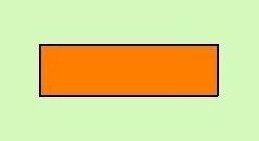 | minus | 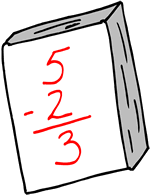 | Subtraction |
 | times /multiplied by | 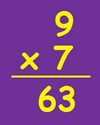 | Multiplication |
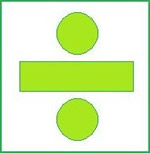 | divided by |  | Division |
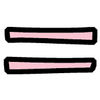 | equals / is |
 | percent / per cent |
 | three squared |
 | five cubed |
 | six to the power of ten |
 | square root of |
Trava-Línguas
 | Peter Piper picked a peck of pickled peppers. Did Peter Piper pick a peck of pickled peppers? If Peter Piper picked a peck of pickled peppers, where's the peck of pickled peppers Peter Piper picked?
|
 | Six sick hicks nick six slick bricks with picks and sticks. |
Subscribe to:
Comments (Atom)



